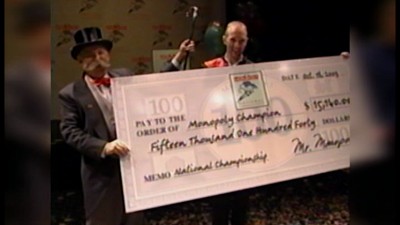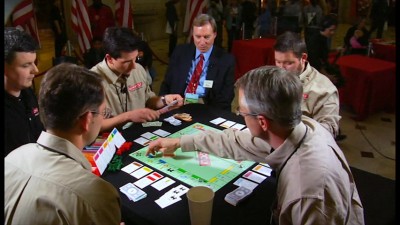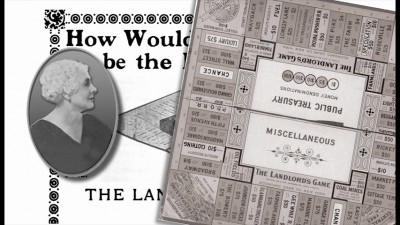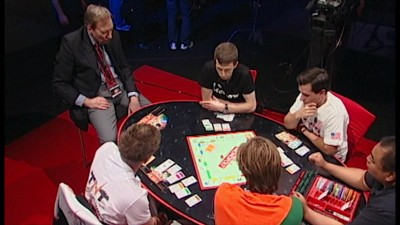| Reviews & Columns |
|
Reviews DVD TV on DVD Blu-ray 4K UHD International DVDs In Theaters Reviews by Studio Video Games Features Collector Series DVDs Easter Egg Database Interviews DVD Talk Radio Feature Articles Columns Anime Talk DVD Savant Horror DVDs The M.O.D. Squad Art House HD Talk Silent DVD
|
DVD Talk Forum |
|
|
| Resources |
|
DVD Price Search Customer Service #'s RCE Info Links |
|
Columns
|
|
|
Under the Boardwalk: The Monopoly Story

When I was a child, I went through a long period where I loved to play Monopoly. (I would like to think that was because I did--and I still do--admire the pleasingly symmetrical color-coded graphic layout of the game board and the little playing pieces, and not because of my having been yet another unwitting participant in mindless-capitalist culture, but the truth probably lies somewhere in between.) So for me (as for, I imagine, millions of others worldwide) Kevin Tostado's documentary Under the Boardwalk: The Monopoly Story has some innate appeal; the title suggests that it will be about the history of this perennially popular board game we all remember--which, in its 75 years or so, has grown to a level of international success unmatched by any other--as well as its significance as a cultural phenomenon. And there are slivers of that here, glimmers of the film that could have been (and that I dearly wish had been.) But the title is misleading, demonstrating the bothersome fact that the difference in one little word can be of tremendous significance: this is not in any way the Monopoly story, but only a Monopoly story, and in light of the opportunities that film wastes to chart what must be the fascinating history of such a ubiquitous pastime, one of the more meager and tiresome of the Monopoly stories available.

What Under the Boardwalk does is focus in on a group of people--a young lawyer from Buffalo, a math teacher from California who uses the game as an innovative educational tool, and a boastful New Zealander, among other Monopoly enthusiasts--who go on to become contestants in the 2009 Monopoly World Championship in Las Vegas, the ultimate culmination of a road that begins with the participation of hundreds of thousands of players in local tournaments. Also participating is a former world champ who happens to live in Las Vegas. Will he reclaim his title? Which of this group of intense, intriguing, offbeat personalities will become the winner? More importantly, of what surpassing interest could such an event be to anyone watching the documentary to warrant spending by far the bulk of the film's time and energy on it? Believe me, despite what appear at first to be reasonable attempts to let us either actually get to know these people or go into some of the history of Monopoly's origins, marketing, and cultural significance, the film is no study of the individual experiences that led the contestants to their avocation, nor does it do any more than scratch the surface of the goldmine of sociocultural explication or historical analysis that Monopoly juggernaut offers; I would estimate that those worthy dimensions of the story get a total of 15 or 20 minutes of the films hour-and-a-half screen time. Those precious moments do contain some gems, with a look at Monopoly-related clips from "The Carol Burnett Show," The Simpsons," and "30 Rock" (and even a surprise mention of and scene from the excellent The King of Marvin Gardens) while also recounting some intriguing facts and trivia, like the way the game was used as a spy tool to rescue British POWs in World War II; the comments of a child psychologist on why children often respond so positively to and possibly benefit from the appealing pretend-participation in and control of a grown-up part of life that the game provides; and the fact that Monopoly was originally conceived, years before its acquisition by Parker Brothers, by a progressive, politically active woman as a propaganda tool to show up the inherent injustices in capitalism. But those portions of the film, rather than mitigating its overall badness, just make it worse: they prove that the filmmakers had full awareness of and access to much more worthwhile paths than the ones they ultimately opted to drag the film (and, by extension, us) down.

Instead, Under the Boardwalk degenerates into some unholy amalgam of the worst tendencies of contemporary television, combining the focus on desperate, ugly competitiveness that is the hallmark of so-called reality programming with the tacky manipulations of those game shows that manipulatively shove assaultive, artificial "suspense" into every millisecond. This approach is taken in both content (a bunch of zany, potentially unstable, hypercompetitive, and unfortunately uninhibited personalities are gonna TAKE EACH OTHER DOWN to win some money and attention) and form, with the latter being the real final nail in the film's coffin. Not only does Tostado fail to realize that, barring more controllable and differently-intentioned fictional stagings for the camera (as with the culminating chess match in Caroline Bottaro's Queen to Play), watching people play a board game, even in a formal tournament (which takes up at least the final quarter of Under the Boardwalk, though it felt much longer), is the very last kind of competitive event that would ever be conducive to cinematic suspense; he also makes the dullness worse by imposing cheesy slo-mo and whooshing sound effects onto the proceedings, which serve only to transform them from boring to laughable.

To its credit, the film never intentionally condescends to the subculture it attempts to document (and nor would I, if only out of solidarity after having the sanity of my own feverish cinephilia questioned too many times). But it doesn't do it any favors by ill-advisedly and amateurishly celebrating one of its showiest but least interesting rituals at the expense of taking a closer look at what makes it tick--at what appeals to and motivates its often obsessive participants. I was probably mistaken to give Under the Boardwalk's makers the benefit of the doubt and take its misleading title at face value, and maybe it's very naive of me to be surprised and disappointed that a documentary about Monopoly veers way too close to the lowest common denominator for my comfort, given that the game could certainly be seen as inherently tending to the crass. But if you are interested in an exploration of the game's history, cultural significance, and lasting popularity that goes in close for an informative look that really mines the potential of those dimensions; if you feel, as I do, that a film subtitled The Monopoly Story is beholden to aspire to such an investigation; and if you happen to share my distaste for the "Big Brother"/"Who Wants to Be A Millionaire" approach to documentation, then I'm only being fair (and doing my job) by warning you away from it.

THE DVD:
Tostado used digital video to shoot his subjects and their journey to the big tournament, and the visual qualities of that technology make a smooth transition from their source to the DVD format, with no flaws deriving from the transfer process discernible in this 1.66:1 aspect ratio, anamorphic presentation.
Sound:The film's sound is well-done and well-transferred to the disc on its Dolby Digital 5.1 surround soundtrack (a 2.0 Dolby Digital Stereo option is also available). The sound quality is very good overall; whether you need to hear such things as the ersatz-folk ode to Monopoly performed by Richard Berman in great hi-fi sound, or even at all, I will leave for you to decide.
Extras:--"Learn from a Pro: The Methods, Math, and Myths of Monopoly" a 40-minute segment featuring Tim Vandenberg--the film's California elementary school teacher who uses Monopoly as a teaching aid--offering strategic advice to pupils.
--If you are a masochist, know one of the four finalists personally, or are yourself one of said finalists, you may want to watch the entire 42-minute 2009 World Championship Final Game. For most civilians, the segments from the game edited into the film's final cut will be much, much more than sufficient.
--Extended scenes from Monopoly playoffs in Australia and Canada that are excerpted more briefly in the film.
--An onscreen, interactive version of the 2009 U.S. Monopoly Championship Qualifying Quiz.
--A quick one-minute clip/blooper reel of narrator Zachary Levi (Chuck) in the sound booth.
FINAL THOUGHTS:Under the Boardwalk: The Monopoly Story is but a shallow, desultory shadow of the rich and interesting film that could have been made about its ostensible subject, a long-running, familiar-to-all fixture of leisure time on an international level. Instead of choosing one of the several fruitful paths hinted at by their hurried, desultory treatment in the film--the twisty-turny, unpredictable gestation of the game as a long-circulating idea before it finally became a brand; the various historical, cultural, and sociological explanations for why the game has stayed so popular for so long all over the world, etc.--the filmmakers have evidently succumbed to some (probably not entirely inaccurate) notion of what holds people's attention, as evinced by faux-suspenseful TV successes like "The Apprentice," and applied it to their filmic presentation of the competitive playing of a board game. The result is predictably grating, ineffectual, and forcedly quirky/whimsical, lacking in even the cheap thrill of victory/agony of defeat dynamics it tries so unnecessarily and futilely to attain. When all is said and done, the best scene in the film is a tantalizing glimpse of The King of Marvin Gardens, to which anyone looking for a worthwhile movie experience should just skip directly (no need to pass Go, no need to collect $200). Skip It.
|
| Popular Reviews |
| Sponsored Links |
|
|
| Sponsored Links |
|
|
| Release List | Reviews | Shop | Newsletter | Forum | DVD Giveaways | Blu-Ray | Advertise |
|
Copyright 2024 DVDTalk.com All Rights Reserved. Legal Info, Privacy Policy, Terms of Use,
Manage Preferences,
Your Privacy Choices | |||||||














